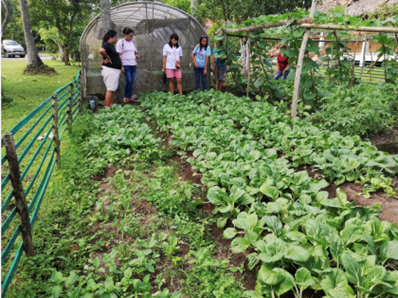By Food Plant Solutions Rotary Action Group

Worldwide, more than 700 million people are undernourished, and one in three children is affected by malnutrition. Global food demand is expected to increase by at least 50% by 2050. 2023 was the warmest year on record. These staggering statistics highlight the critical need for tools and resources to support climate-resilient food systems.
Formed in 2007, the Food Plant Solutions Rotary Action Group was established to address hunger and malnutrition and improve food security by helping clubs and communities identify and cultivate highly nutritious local food plants.
Using Food Plants International’s database, we identify highly nutritious local food plants and create educational resources including how to grow native food plants, the key nutrient content within those plants, and the importance of those nutrients to human health.
This approach helps clubs and communities make informed choices, thus enabling them to select their foods according to the nutritional, economic, and environmental impact on themselves and their communities.
Environmental Sustainability and Food Production
In many areas, the lack of understanding about soil and plant nutrition leads to poor crops and eventually forces farmers to use more inorganic fertilisers. Our resources not only identify highly nutritious food plants but also promote and include agroecological practices, such as the enriching of soil through natural methods like composting and manure or the planting of cover crops, where the generated produce protects the soil and improves it at times. Our plant selection always takes into account the climatic characteristics of the region, including the impact of climate change.
Recent Activities
The impact of our action group is tangible. Here are just a few examples:
In Cameroon, in partnership with Hope 4 a Better Future Foundation (H4BF), we provided tools and knowledge for women and girls to produce seasonal vegetables and crops in their homes and community parcels. H4BF said “Your materials have been used by over 200 women in Cameroon, taught them about nutrition, the value of different crops, and how to grow the right crops to meet their nutritional needs. Other projects train women to cultivate vegetables, but your materials give them the choice to decide to cultivate more of those that are high in nutrition. You don’t just help women grow food, you make them understand the value before growing them. That is innovative.”
In Vietnam, trial gardens in two schools in 2012 have now expanded to two provinces, 14 schools, and directly affect 3000 children and 380 adults. The students at the schools enjoy the benefits of the plants they have grown as they provide them with a nutritious lunch each day. Families are duplicating the school gardens at home. Schools are saving money from not having to buy food. Malnutrition has been eradicated in some areas. Students and residents learn the value and skills of regenerating soil nutrition.

In Uganda, grandmothers formed groups to support over 500 families. Amongst their support, the groups share sustainable agricultural techniques taught by trainers using the Food Plant Solutions Rotary Action Group booklets translated into Luganda. These booklets contain information on soil preparation, nutritious value of the local plants to grow, and cultivation techniques.
Getting Involved
There are many ways you can collaborate with the Food Plants Solutions Rotary Action Group:
- Become a member. Help us spread the word about our work. Join as an individual member or as a Rotary or Rotaract club.
- Volunteer with us. We need your skills, enthusiasm, and experience.
- Donate. Many of the clubs who ask us for assistance do not have funds to print the booklets. Covering production costs is our biggest challenge.
- Learn more. We can present to your club via Zoom or provide you with a PowerPoint for you to present.
- Start a chapter. Your country or region may benefit from the Food Plant Solutions approach.
- Introduce us. If you know of any group or non-governmental organization that could benefit from our expertise, we would appreciate an introduction.
The Food Plant Solutions Rotary Action Group has the mission to provide information on sustainable, nutritious plants that can be grown locally in any part of the globe. We have access to a databank of over 35,000 edible plants. And we have the answer to food security and ending malnutrition, which is the major killer of children under the age of 5.
Join us and be part of an organisation that cares for people and the planet we live on. Visit our website or contact us at info@foodplantsolutions.org

Love this!
Wonderful article.
Laurie N. Zuckerman
Director of Communications
ESRAG https://www.esrag.org/, Environmental Sustainability Rotary Action Group
+1-208-631-1890
Thanks, Laurie! We’re glad you enjoyed it.